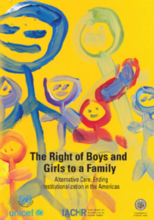This report by the Inter-American Commission on Human Rights (IACHR) analyzes children’s right to live and be raised by their families, and establishes the resulting obligations for States when it comes to supporting and strengthening families’ ability to raise and care for their children. The IACHR states that there is no traditional or limited concept of family, as that would interfere with people’s right to a private life. Moreover, the Commission understands that different types of family ties exist in today’s society. The report also analyzes the most common circumstances in which a protection measure may be issued involving the separation of a child from his or her family. Such circumstances include a family’s lack of material resources; violence within the home; and relinquishment of custody or abandonment. The IACHR concludes that even though international human rights law has established that poverty and the lack of material means should not be a reason for children to be separated from their families, in practice, in the Americas, poverty continues to be the backdrop for many cases in which children enter a residential institution. This report also indicates concern over the fact that children from traditionally excluded sectors of society, such as Afro-descendant or indigenous children and children with disabilities, are overrepresented in residential institutions.
In terms of standards, the IACHR establishes in the report that the principles of exceptionality, necessity, and temporariness should prevail when it comes to applying special protection measures that involve the separation of children from their families. The IACHR underlines that special protection measures should, first of all, contemplate the possibility that children can be taken in within their extended or expanded family, as this is the measure that is most respectful of their rights; if this is not possible or not in a child’s best interests, the measures should consider the alternative of care in a foster family. In its conclusions, the IACHR establishes that institutional/residential care should be limited to those cases in which it is necessary and suitable, based on the best interests of the child, ensuring that the child will not remain in an institutional/ residential care facility for longer than is strictly necessary. Moreover, the Commission calls for substituting large residential institutions with smaller care centers that can provide personalized, quality care with a dynamic similar to that of a family and in a context close to the community to which the child belongs. The IACHR also calls on States to properly regulate the operation of residential care facilities and carry out proper oversight, investigating them and, where appropriate, punishing any violations of children’s rights that take place in these facilities.
For a Press release in English summarizing the key findings, please click here.
For the full report in Spanish, please click here.

